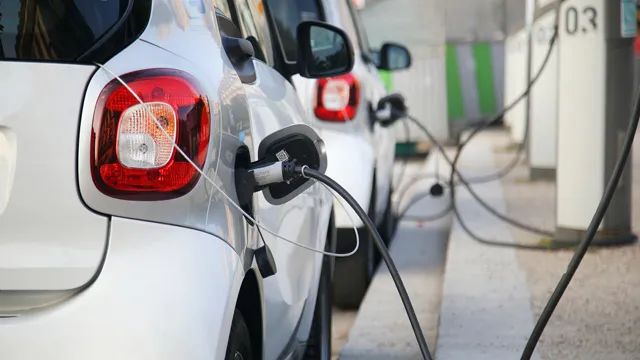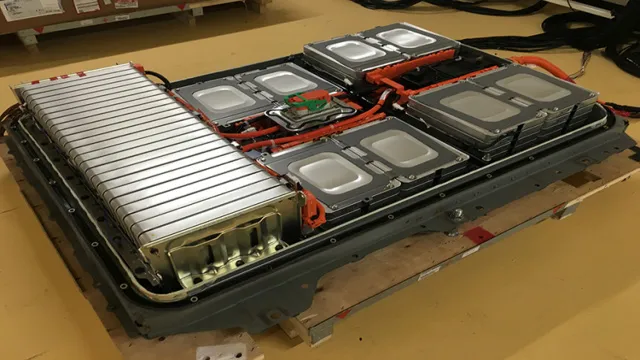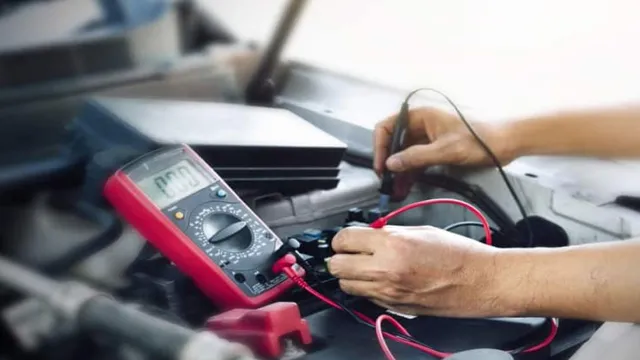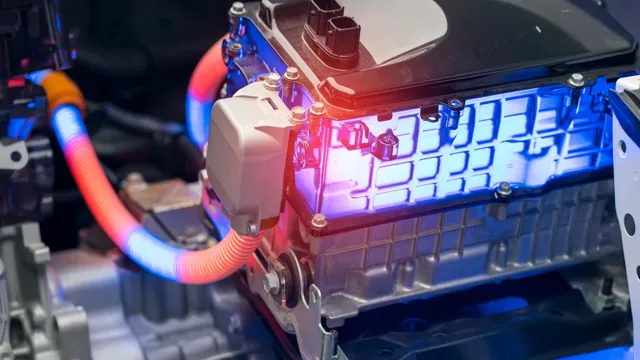Shocking Revelation: Exploring the Potential Dangers of Electric Car Batteries
Are electric car batteries safe? It’s a question that has been on the minds of many people. There have been some concerns about the safety of electric car batteries, with some people worrying that they could be dangerous or even deadly. But can electric car batteries really kill you? In order to answer this question, it’s important to understand how electric car batteries work and what safety precautions are in place to prevent accidents.
In this blog post, we’ll take a closer look at this topic and provide you with all the information you need to keep yourself and your loved ones safe while driving an electric vehicle. So, sit back and let’s explore the world of electric car batteries.
The Science Behind Electric Car Batteries
If you’re wondering if electric car batteries can kill you, the answer is yes and no. While it’s true that electric car batteries can be fatal if not handled or maintained properly, it’s important to understand the science behind it. Electric car batteries contain large amounts of energy stored in the form of chemical reactions that take place within them.
When these reactions occur, they generate a current that powers the car. The danger lies in the fact that if something goes wrong, such as an accident or an electrical problem, the batteries can release this energy suddenly and explosively. However, most electric cars are designed with multiple layers of protection to prevent this from happening, including safety features such as reinforced battery shields and automatic cutoff switches.
Proper maintenance and handling of electric car batteries is crucial to ensure their safety and longevity. While the idea of electric car batteries being deadly is certainly daunting, the truth is that as long as they are used correctly and cared for properly, they pose no greater risk than any other form of energy storage.
How Electric Car Batteries Work
Electric car batteries are complex systems that store energy and provide power for electric vehicles. A typical battery pack contains several modules, each made up of smaller cells that are connected in series and parallel configurations. The main component of these cells is a cathode and anode, separated by an electrolyte.
When the battery is charged, electrons from the cathode flow through an external circuit to the anode, creating a flow of electricity. To power the vehicle, this process is reversed, and the battery releases stored energy, creating a flow of electrons from the anode to the cathode. The performance of an electric car battery depends on several factors, including its chemistry, temperature, and charging and discharging methods.
Modern lithium-ion batteries are commonly used due to their high energy density and efficiency, but research continues to develop new and improved battery technologies. As the popularity of electric vehicles increases, the development of better, more advanced batteries will be critical to achieving higher performance, longer ranges, and lower costs.
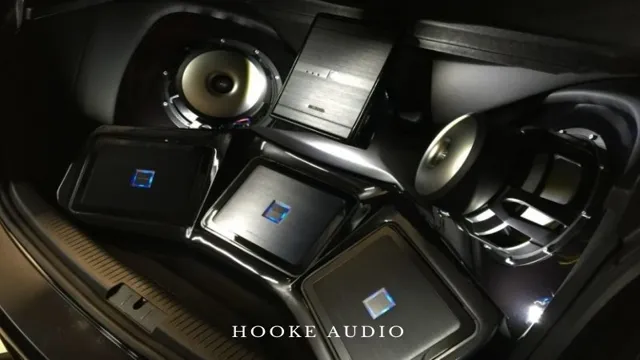
The Chemical Composition of Electric Car Batteries
Electric car batteries are a fundamental part of modern electric cars as they provide the energy needed to power them. While there are various types of batteries available, lithium-ion batteries are the most commonly used in today’s electric vehicles. Lithium-ion batteries work by allowing lithium ions to move between the battery’s two electrodes, namely the anode and the cathode.
The anode is usually made of graphite, while the cathode is a mixture of lithium and other materials such as cobalt, nickel, or manganese. It is the combination of these materials that allows lithium-ion batteries to store energy efficiently. Additionally, the electrolyte, the substance that conducts ions between the anode and cathode, is typically a lithium salt dissolved in an organic solvent.
This chemical composition is what makes electric car batteries rechargeable and long-lasting, allowing electric cars to travel long distances on a single charge.
Is Electric Car Battery Leakage Dangerous?
Many people are understandably worried about the potential dangers of electric car batteries. While these vehicles are generally considered safe for everyday use, there have been some concerns about the risk of battery leakage. So, can electric car batteries kill you? The answer is complicated.
While there have been some cases of accidents or fires related to electric car batteries, the likelihood of a serious injury is relatively low. That being said, it is important to handle these batteries with care and to follow any recommended safety precautions. Like any technology, electric car batteries come with their own set of risks and rewards, and it’s up to consumers to weigh these factors before deciding whether to invest in this innovative form of transportation.
Risks of Battery Leakage
Electric car batteries are complex devices that contain potentially harmful chemicals such as lithium-ion. While they are designed to be safe, there is always a risk of battery leakage. The leakage from an electric car’s battery can be dangerous if it comes into contact with skin or eyes.
The liquid is highly corrosive and can cause burns and irritation. Ingesting the liquid is also harmful and can result in serious health consequences. Additionally, battery leakage can be damaging to the environment if it’s not properly handled.
It can contaminate groundwater and soil, leading to pollution. However, electric vehicle manufacturers take significant precautions to prevent battery leakage. The batteries are sealed, and additional safety features are incorporated.
In the unlikely event of a battery malfunction, electric car owners should contact emergency services for guidance on how to safely handle the situation. Overall, while there is a potential risk of battery leakage, electric cars are considered safe, and industry standards and guidelines ensure that the risk is minimized.
Precautions to Take
Electric car batteries do not typically leak, but it is always best to take precautions to ensure safety. While leaks can occur due to accidents or damages, the likelihood is low and can be minimized by keeping up with routine maintenance and not damaging the battery. In the event of a leak, one should immediately remove themselves from the area and call for professional assistance.
It is also advisable to avoid touching any fluid from the battery or allowing it to come in contact with skin or clothing. While electric car battery leaks may not be as dangerous as gasoline leaks, it is still important to take necessary precautions to avoid any potential hazards. By staying aware and taking preventative measures, electric car owners can enjoy a safe and environmentally-friendly mode of transportation.
Safety Measures to Follow
Electric car battery leakage can be dangerous if proper safety measures are not taken. Lithium-ion batteries are used in electric cars, and when they leak, they can release toxic and flammable chemicals that can cause harm to the environment and even human health. It is important to ensure that the batteries are well-maintained and checked regularly to avoid any leaks.
If a leak is detected, it is recommended to immediately take the car to a professional for repair and to avoid touching the leaked substance. It is also crucial to store and dispose of old batteries properly to prevent any environmental pollution. So, while electric cars are a more sustainable and eco-friendly mode of transport, it is important to follow safety guidelines to prevent any potential harm.
Electric Car Battery Explosions: Exploring the Myth
The myth that electric car batteries can explosive and kill you is just that – a myth. Although explosions and fires can occur in rare cases, it’s no different than with any other type of vehicle. In fact, studies have shown that the likelihood of a fire occurring in an electric car is actually lower than that of a combustion engine car.
This is because electric car batteries are designed with safety features like insulation, cooling systems, and automatic shutoffs that prevent overheating and damage. Plus, electric car batteries are rigorously tested and regulated for safety before they’re put on the market. While it’s true that electric car battery explosions can happen, it’s extremely unlikely and shouldn’t deter anyone from considering or purchasing an electric vehicle.
Rarity of Electric Car Battery Explosions
Electric car battery explosions are often the subject of heated debates between both supporters and skeptics of electric vehicles. However, the myth that electric car batteries explode frequently is far from the truth. In fact, electric car battery explosions are incredibly rare and shouldn’t be a cause for concern for potential electric vehicle buyers.
Electric cars come with several safety features like batteries encased in a metal shell, which minimizes the risk of explosion. Also, electric car battery technology has come a long way, and modern-day electric car batteries are much safer and reliable than their predecessors. It’s worth noting that gas-powered cars are more likely to burst into flames than electric cars.
Therefore, concerns about electric car battery explosions are unwarranted. The bottom line is that electric car battery explosions are much rarer than most people believe, and electric vehicles remain a safe and reliable mode of transportation.
Why Explosions Happen and How to Avoid Them
Electric car battery explosions have been a hot topic in recent years, with many people fearing that they are more dangerous than traditional gasoline-powered cars. However, this is a myth that has been perpetuated by sensationalized media coverage. While explosions can occur in any type of vehicle, including electric cars, the likelihood is incredibly low.
In fact, studies have shown that electric cars are actually safer than traditional cars when it comes to fire and explosion risk. This is because electric car batteries are designed with safety in mind, with intricate systems and protocols in place to prevent thermal runaway and other dangerous situations. So, while the fear of electric car battery explosions may be unfounded, it’s always important to follow proper charging and maintenance procedures to ensure the safety and longevity of your vehicle’s battery.
How to Properly Dispose of Electric Car Batteries
Many people wonder if electric car batteries can kill you. While the answer is technically yes, it’s highly unlikely as long as you handle them properly. However, improperly disposing of electric car batteries can be dangerous for both humans and the environment.
These batteries contain toxic and flammable chemicals, such as lithium, that can be harmful if they leak into the environment. It’s crucial to dispose of electric car batteries at designated recycling facilities that have the proper equipment and expertise to handle them safely. When you recycle your electric car battery, it’s broken down into its individual components, such as lithium and cobalt, which can be reused to make new batteries or other products.
By recycling your electric car battery, you’re helping to reduce waste, protect the environment, and even potentially save lives.
Conclusion
In conclusion, while electric car batteries do carry a potential danger, the likelihood of them causing harm to you is extremely rare. In fact, you are more likely to be struck by lightning or win the lottery than to be injured or killed by an electric car battery. So, in other words, if you’re worried about electric car batteries killing you, you might want to focus your attention elsewhere.
Perhaps on avoiding lightning strikes, or figuring out how to increase your chances of winning the lottery. Happy lightning-avoiding and number-picking!”
FAQs
How dangerous are electric car batteries?
Electric car batteries are generally safe, but they do pose risks if not handled properly. If the battery is damaged or improperly stored, it can lead to electric shock, fire, or explosion. However, these incidents are rare.
Can electric car batteries electrocute you?
It is possible to receive an electric shock from an electric car battery, but it is very unlikely. The battery is designed to prevent electrical contact, and the car’s safety systems are designed to shut off the electrical system in the event of a crash.
Are there any health concerns with electric car batteries?
There are no major health concerns associated with electric car batteries. The batteries contain chemicals and metals, but they are sealed and are not released into the environment. In fact, electric cars are generally considered to be less harmful to human health and the environment compared to traditional gas-powered cars.
What precautions should I take with my electric car battery?
To ensure the safety of your electric car battery, it is important to follow the manufacturer’s instructions for charging, storing, and maintaining the battery. Do not attempt to repair or modify the battery yourself, and avoid exposing the battery to extreme temperatures or water. If you notice any signs of damage, such as swelling or leakage, contact a professional.

